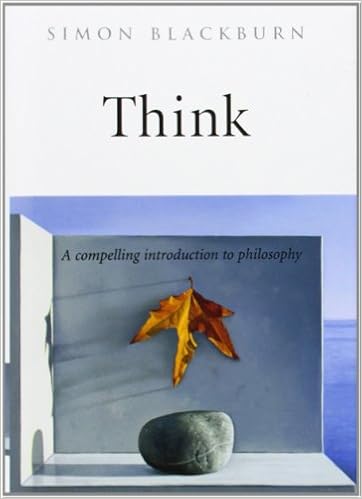In 2002, the United Nations declared that every 3rd Thursday in November would be celebrated as World Philosophy Day. Hooray! Philosophy can expand your mind and make you question just about anything. If you've ever wondered about the world - from truth, knowledge, and ethics to beauty, politics, and the nature of reality - then you'll find something in philosophy for you. Philosophy is divided into numerous fields, but if you're just starting to test the waters, here are four recommended reads for a newbie.
 The first book on the list is Simon Blackburn's Think: A compelling introduction to philosophy. Simon Blackburn wrote the Oxford Dictionary of Philosophy, but don't let that intimidate you. This book was written as a primer for anyone wanting to learn more about philosophy. In each chapter, the author discusses a major philosophical idea such as free will, and brings up different arguments, while using quotes and examples from famous philosophers.
The first book on the list is Simon Blackburn's Think: A compelling introduction to philosophy. Simon Blackburn wrote the Oxford Dictionary of Philosophy, but don't let that intimidate you. This book was written as a primer for anyone wanting to learn more about philosophy. In each chapter, the author discusses a major philosophical idea such as free will, and brings up different arguments, while using quotes and examples from famous philosophers.  The second book is ideal for people who tend to prefer fiction over non-fiction: Sophie's World by Jostein Gaarder. This bestselling novel begins when a teenager comes home and finds some mysterious notes in her mailbox. This sets off Sophie's journey through the history of Western philosophy. The book is entertaining as a philosophical mystery, but the story serves to to sketch the outlines of the basic philosophical arguments that have appeared through throughout time. Perfect for a questioning beginner of any age!
The second book is ideal for people who tend to prefer fiction over non-fiction: Sophie's World by Jostein Gaarder. This bestselling novel begins when a teenager comes home and finds some mysterious notes in her mailbox. This sets off Sophie's journey through the history of Western philosophy. The book is entertaining as a philosophical mystery, but the story serves to to sketch the outlines of the basic philosophical arguments that have appeared through throughout time. Perfect for a questioning beginner of any age!My third recommendation is
 The Deepest Human Life: An introduction to philosophy for everyone by Scott Samuelson. Recently awarded the 2015 Hiett Prize in the Humanities, Samuelson is also known for his pro-humanities essay called Why I Teach Plato to Plumbers, written for the Atlantic in 2014. This engaging book was written, like Simon Blackburn's, to be an introduction to philosophy for anyone interested in the human condition. Divided into four parts, the Samuelson goes over classic philosophical problems and relates them to everyday life.
The Deepest Human Life: An introduction to philosophy for everyone by Scott Samuelson. Recently awarded the 2015 Hiett Prize in the Humanities, Samuelson is also known for his pro-humanities essay called Why I Teach Plato to Plumbers, written for the Atlantic in 2014. This engaging book was written, like Simon Blackburn's, to be an introduction to philosophy for anyone interested in the human condition. Divided into four parts, the Samuelson goes over classic philosophical problems and relates them to everyday life.  Last but not least is The Book of Dead Philosophers by Simon Critchley. Okay, this one won't be as useful as the others - it's not a discussion of basic philosophy but a list of how famous philosophers have died. Nonetheless, it's entertaining to skim through the pages of this tome. Critchley lists numerous philosophers and gives tidbits of each one before announcing how they met their untimely (or timely) ends. You may discover an interesting philosopher that you didn't come across in the other books. Happy reading (and philosophizing)!
Last but not least is The Book of Dead Philosophers by Simon Critchley. Okay, this one won't be as useful as the others - it's not a discussion of basic philosophy but a list of how famous philosophers have died. Nonetheless, it's entertaining to skim through the pages of this tome. Critchley lists numerous philosophers and gives tidbits of each one before announcing how they met their untimely (or timely) ends. You may discover an interesting philosopher that you didn't come across in the other books. Happy reading (and philosophizing)!






No comments:
Post a Comment